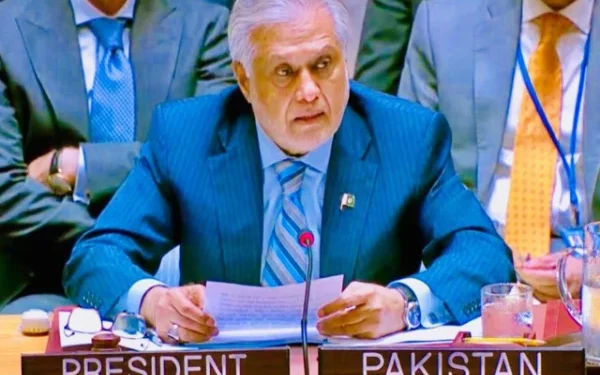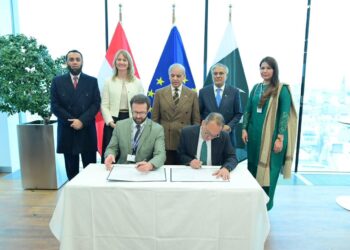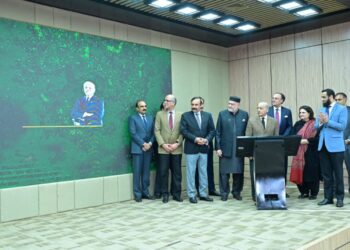Introduction: A Strong Voice Against Islamophobia on a Global Stage
New York, United Nations Headquarters – In a powerful and assertive address at the United Nations Security Council, Deputy Prime Minister and Foreign Minister of Pakistan, Senator Ishaq Dar, has called for a united global response to the rising tide of Islamophobia. While chairing a high-level meeting on enhancing cooperation between the Organization of Islamic Cooperation (OIC) and the United Nations (UN), Ishaq Dar underscored that the world can no longer afford to ignore the alarming growth of anti-Muslim hatred, discrimination, and violence.
Dar’s remarks marked a critical moment in international diplomacy, as Pakistan reaffirmed its commitment to building bridges between global institutions like the OIC and the UN to foster dialogue, peace, and mutual understanding. The Foreign Minister emphasized that Islamophobia is not just a Muslim problem, but a threat to the values of global coexistence, human rights, and peace.
A Call for Collective Global Action Against Islamophobia
At the core of Ishaq Dar’s address was a clear and categorical demand for collective international action to combat Islamophobia. He described it as a pervasive and rising challenge, fueled by misinformation, hate speech, media bias, and far-right political narratives. According to Dar, the trend poses serious risks not only to Muslim communities across the globe but also to the principles enshrined in the UN Charter, including equality, justice, and freedom of religion.
“Collective action against Islamophobia is inevitable,” Dar stated firmly. “It is time for the world to adopt a coordinated, inclusive, and strategic approach to eliminate this growing menace that threatens global peace and social cohesion.”
He urged UN member states to adopt practical steps, such as strengthening laws against hate crimes, regulating social media platforms to prevent the spread of anti-Muslim propaganda, and promoting interfaith dialogue and education to counter stereotypes and foster respect.
Background: Islamophobia as a Global Crisis
Islamophobia has been increasingly recognized as a serious international concern. From violent attacks on mosques in the West, to legislation targeting Muslim identity, such as bans on religious clothing, Muslims are facing heightened levels of discrimination. The UN General Assembly, in 2022, passed a Pakistan-sponsored resolution designating March 15 as the International Day to Combat Islamophobia. This resolution gained widespread support and was seen as a milestone in acknowledging Islamophobia at a global level.
Senator Ishaq Dar’s comments further built upon this momentum, pushing for institutional responses and tangible commitments from both the OIC and the broader international community.
Pakistan’s Stand on Kashmir: A Persistent Voice for the Oppressed
During the Security Council session, Dar also highlighted the plight of the oppressed people of Indian-occupied Jammu and Kashmir, emphasizing that they continue to be deprived of their right to self-determination, a right that has been reaffirmed in multiple UN Security Council resolutions over the decades.
“The people of Kashmir must be given their basic right of self-determination, as promised in the United Nations resolutions,” Dar declared. “The continued denial of this right undermines the credibility of the international legal order.”
Dar also linked the systematic oppression of Kashmiris to broader patterns of Islamophobia, noting that Muslim communities facing state-led repression, whether in Kashmir, Palestine, or other regions, suffer under similar ideologies of exclusion and ultra-nationalism.
OIC-UN Partnership: A Framework for Peace and Multilateral Cooperation
Senator Dar, while chairing the high-level meeting, lauded the growing partnership between the Organization of Islamic Cooperation and the United Nations, describing it as a critical mechanism for resolving global conflicts, promoting sustainable development, and ensuring the protection of human rights.
“It is a matter of great pride for Pakistan to chair this important meeting. The OIC’s partnership with the UN must continue to grow stronger and more meaningful. Together, we can tackle the humanitarian crises affecting the Muslim world,” he remarked.
The OIC, which represents over 1.8 billion Muslims in more than 57 member states, has long been a vocal advocate for conflict resolution, humanitarian assistance, and cultural understanding. Dar pointed out the organization’s efforts in promoting peace in:
- Occupied Kashmir
- Palestine
- Libya
- Syria
- Afghanistan
- Yemen
He noted that in each of these regions, OIC interventions—diplomatic, humanitarian, and political—have played a constructive role, often in tandem with UN missions and frameworks.
Pakistan’s Role in Promoting Peace Through Multilateralism
Dar’s leadership in this session reinforced Pakistan’s proactive diplomatic role on the international stage, especially at a time when the country is seeking to rebuild its global image and enhance regional cooperation.
Two days prior to the Security Council meeting, Pakistan had introduced a resolution advocating peaceful dispute resolution, which was adopted unanimously by all Security Council members. The resolution urged the international community to resolve global conflicts through:
- Dialogue and negotiation
- Mediation and arbitration
- Judicial settlement through international courts
This diplomatic success further elevated Pakistan’s credibility and influence at the UN, showcasing its commitment to non-violence, diplomacy, and legal mechanisms for peace.
International Response and Diplomatic Support
Senator Dar’s call for united action against Islamophobia was well received by several member states, particularly those from the Global South, who echoed Pakistan’s sentiments about the need for inclusive international policies that protect religious and ethnic minorities.
A number of representatives from OIC member countries, including Turkey, Indonesia, Malaysia, Saudi Arabia, and Iran, expressed support for the strengthening of OIC-UN collaboration, especially in:
- Addressing humanitarian crises
- Combatting anti-Muslim bigotry
- Ensuring fair representation of Muslim concerns in global governance institutions
Western nations were also cautiously receptive, with some diplomats recognizing the importance of fighting religious hate and promoting interfaith tolerance, though opinions differed on the mechanisms for doing so.
The Road Ahead: Institutionalizing the Fight Against Islamophobia
One of the key outcomes of the meeting was the proposal to establish a permanent UN-OIC mechanism for monitoring, reporting, and responding to Islamophobic incidents worldwide. Pakistan, under Dar’s leadership, is advocating for:
- A UN Special Envoy on Islamophobia
- A Global Report on Anti-Muslim Hatred published annually
- Support for Muslim minorities in non-OIC countries, including Rohingya Muslims in Myanmar, Uighur Muslims in China, and Muslims in India and Western Europe
Such institutional steps, if implemented, could mark a historic turning point in global human rights advocacy, offering Muslims worldwide a stronger voice in international policymaking.
Conclusion: Pakistan’s Diplomatic Commitment to Justice and Inclusion
Deputy Prime Minister Ishaq Dar’s chairmanship of the Security Council meeting on OIC-UN cooperation has amplified Pakistan’s voice on key global issues, particularly the growing challenge of Islamophobia and the unresolved crisis in Kashmir.
His strong statements and diplomatic finesse have reaffirmed Pakistan’s position as a responsible international actor, deeply committed to peaceful conflict resolution, religious freedom, and global cooperation.
In an era marked by rising polarization, identity politics, and ethnic divisions, such calls for unity and mutual respect are not only timely—they are essential.

























